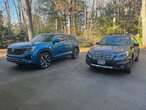Road congestion is a persistent thorn in the side of our car-centric society. It’s loud, stressful, dangerous, and worsens air quality. It’s been linked to all kinds of adverse health effects, including lower birth weights, memory and attention problems in school kids, higher mortality in elderly adults, and even crime. But traffic might also affect our eating habits—and not in a good way.
A new study from the University of Illinois Urbana-Champaign, published in the Journal of Urban Economics, examined weekday traffic data from Los Angeles County highways between 2017 and 2019 and compared it with cellphone GPS data tracking customer visits to fast food restaurants in the same county during the same years. They found that when traffic was worse due to unexpected slowdowns, visits to fast food restaurants went up. This effect was especially strong if the traffic delays occurred around evening mealtimes, when drivers were leaving work and probably starting to feel some predinner hunger pangs.
The results showed that for every 30-second increase in traffic delay per mile traveled, there was a 1% increase in visits to fast food restaurants. While that may not seem like a lot, the researchers estimate that over a year, it amounts to about 1.2 million more fast food meals in Los Angeles. “We’ve been saying that our results are modest but meaningful,” says Becca Taylor, assistant professor in the university’s Department of Agricultural and Consumer Economics, and coauthor on the study.
Indeed, this relationship has implications for health and wellness. Fast food tends to be high in ultra-processed ingredients, saturated or trans fats, sugar, and sodium, all of which can increase one’s risk of developing a number of diseases and ailments, including obesity, heart disease, high blood pressure, high cholesterol, diabetes, and even depression. Some researchers go so far as to say processed foods and fast foods are responsible for more premature deaths than cigarettes.
Meals prepared at home are by far the healthier option. People who eat home-cooked meals more often have a better mix of fruits and vegetables in their diets, and are exposed to fewer harmful chemicals, including so-called forever chemicals. We also are more likely to overeat at restaurants than we would at home. So it’s troubling that gridlock may be nudging hungry people toward McDonald’s for dinner when they might have otherwise eaten a more balanced meal at home.
Los Angeles is a city infamous for its snarled highways, but the authors say these findings can be applied elsewhere. “There are other cities in the U.S. that are equally congested and have these big swings in traffic congestion,” Taylor says, listing off New York, Chicago, and Washington, D.C. She hopes the research can help make the case for prioritizing traffic solutions, like better public transportation or congestion charges, such as the one recently introduced in New York. “We see this as another thing policymakers could have in their arsenal for why it’s important for them to spend political capital working on congestion,” Taylor says.
While this study might seem on the surface to be just about traffic, look a bit deeper and you’ll realize it’s really about time, or lack of it. We have a limited number of waking hours during which we can get things done, and most of them are consumed by work. Ideally we can spend what little time we have leftover doing things we find nourishing and fulfilling like, say, sitting down for a meal with our family. But we don’t have a lot of wiggle room, and any delay, including an unexpected traffic slowdown, can force us to make an unhealthy trade-off.
This is all quite troubling when you consider that the American workday is getting longer, traffic in the U.S. is getting worse, and fast food restaurants keep multiplying. It’s a bad combination. While infrastructure improvements are important, maybe it would be easier to just give Americans more free time. Taylor and her colleagues say allowing people to work from home, or reducing the number of days they’re required to be in the office, might be able to help here. “Time scarcity is one of the strongest correlates of fast food consumption,” the authors write. “Policies aimed at loosening time constraints would help battle unhealthy eating habits.”








No comments